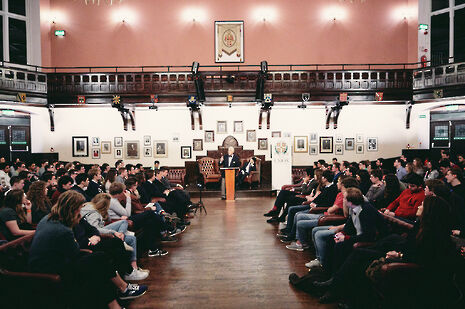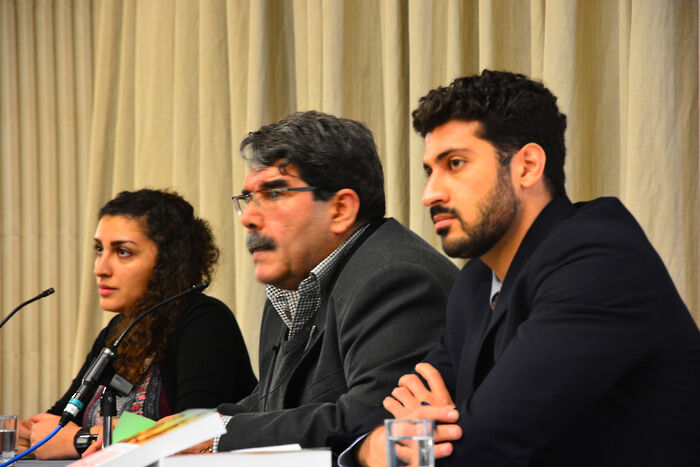What’s going on with the higher education ‘free speech’ debate?
As new free speech guidelines have come under scrutiny this week, we give you a breakdown of the controversy as it stands

Universities Minister Sam Gyimah MP announced a series of reforms to free speech at universities on Thursday.
If implemented, Gyimah’s proposals – which include a crackdown on “institutional hostility to unfashionable views” – would mark the first government intervention on free speech on university campuses since the Education Act of 1986.
The question of whether free speech at British universities is being threatened has been fraught with controversy in recent months. Sam Gyimah, as well as previous Universities Minister Jo Johnson, have accused safe spaces, no-platforming, and trigger-warnings as impeding free expression.
However, many campaigners have pointed to the Prevent legislation as a greater hindrance to freedom of speech, arguing that the policy aimed at preventing ‘radicalisation’ may be used as a guise for universities to refuse controversial or unpopular speakers a platform.
What reforms have been suggested?
Sam Gyimah has called the action of no-platforming “chilling,” and has claimed that it risks becoming a “brake on legal free speech.” He has suggested that updated guidance on free speech at university campuses should “clarify the rules and regulations around speakers and events to prevent bureaucrats or wreckers on campus from exploiting gaps for their own ends.”
The new guidance would be regulated by the Office for Students (OfS), working from new rules drafted by ministers. The National Union of Students (NUS), university vice-chancellors, and regulators will also be able to have an input. The end result would be that the OfS will have the right to fine and shame any institution which it deems to be in breach of these rules.
Some have cited the retraction of an invitation to speak to radical feminist Linda Bellos at a Beard Society event as censorship of unpopular views. Bellos was ‘no-platformed’ by the Peterhouse feminist society in October on account of her political stance on transgender rights.
More recently, students at Bristol University stormed into a hall where Conservative MP Jacob Rees-Mogg was due to give a speech, making the national press.
Is the outcry over the threat to freedom of speech an exaggeration?
Gyimah’s announcement has been met with sharp criticism across the higher education sphere.
The Joint Committee on Human Rights, a cross-party group of ministers, released a report looking into the issue of freedom of speech at universities on Tuesday 27th March, which found claims of widespread censorship on campus to be “exaggerated”.
The report concluded that it “did not find the wholesale censorship of debate in universities which media coverage has suggested”, adding that although censorship of speech “is a serious problem”, it “is not a pervasive problem”.
“We did not find the wholesale censorship of debate in universities which media coverage has suggested”
The report claimed that “regulatory complexity”, “intolerant attitudes” and “incidents of unacceptable intimidating behaviour” were present at British universities, but had not made significant impacts.
In its summary, the report said that “the evidence we have taken shows that overall there is support for the principle of freedom of speech among the student population,” and that some fears surrounding restrictions on free speech came from “a small number of incidents which have been widely reported”.
Are safe spaces hindering free speech?
The Joint Committee on Human Rights inquiry did, however, criticise ‘safe spaces’, arguing that they “cannot cover the whole of the university or university life without impinging on right to free speech.”
Cambridge was one of four universities to submit evidence to the committee, along with Edinburgh, Sheffield Hallam and London South Bank, and was the only one to explicitly defend ‘safe spaces’. It claimed that it “supports unequivocally the right of students to meet in safe spaces.”
The University has said that it hoped that safe spaces will encourage students to develop the confidence to express their views in a wider environment, and considers them a “vital part of participation in a university education.”
However, it sought to make clear the distinction between ‘safe spaces’ and ‘no-platforming’, adding that if no-platforming “occurs within a safe space environment, this could be contrary to the University’s statement on freedom of speech and may even be illegal.”
How does this sit with Prevent?
Daisy Eyre, the current CUSU president, told Varsity that she believed Gyimah had a “fundamental misunderstanding of the issue at hand” and she criticised those who “seem to have confused vocal opposition to offensive and violent views with attempts to actually shut down free speech.”
Got a story for us?
Seen something you think Varsity should be talking about? Contact our News team at news@varsity.co.uk.
Eyre is among critics of the new guidance who deem the government’s highly controversial Prevent duty as posing the greater threat to free speech at universities. CUSU submitted evidence to the free speech inquiry criticising the Prevent strategy, stating that there is “clear evidence that free speech is being suppressed at the University of Cambridge” and that there’s a “worrying trend in the suppression of the freedom of expression”.
Prevent is one part of the government’s four-strand counter-terrorism ‘Contest’ strategy, aimed at supporting people who are deemed to be at risk of radicalisation. The Prevent duty calls on UK institutions – including universities – to refer any suspicions to a local Prevent body. Cambridge University has said it would take a “light touch” approach to the policy, so as to avoid undue discrimination and restriction of free speech.
The Joint Committee on Human Rights report also called for further governmental review of the Prevent policy, saying that it “should include consideration of its impact on free speech in universities particularly on Muslim students but also on students of other faiths or no religious faiths.”
The issue of Prevent came under particular scrutiny at Cambridge after the University intervened in a Palestine Society discussion panel over concerns of the chair’s impartiality. The University later apologised for barring the chair, SOAS academic Dr Ruby Salih, from leading the panel. A recent investigation by Varsity also highlighted vast disparities between colleges’ approaches to Prevent.
What happens next?
Currently Gyimah is calling for one common set of guidelines to be followed by both students and universities governing free speech.
The committee has produced a document for student societies with guidance on how they can avoid committing illegal offences whilst hosting speaker events in order to “avoid confusion and complexity about what is and what is not permissible.”
They have also suggested that the OfS should develop guidelines that “ensure university policies proactively secure lawful free speech and are not overly burdensome”.
It is not clear yet how Gyimah is intending on implementing these guidelines as an act or legislation. One possibility would be an amendment to the 1986 Education Act, as it currently states that it is the duty of individuals of the governing body to take reasonable steps to ensure that the code of practice regarding free speech is complied with within the institution.
A University of Cambridge spokesperson noted: “The University has a code of practice on meetings and public gatherings on University premises that ensures the use of University premises is not inappropriately denied to any individual or body of persons on any ground connected with their beliefs or views or the policy or objectives of a body (with the exception of proscribed organisations) of which they are a member.”
Gyimah may introduce legislation which would make his announcement binding by generating a formulaic procedure. However, it is not yet clear whether a ‘one-size-fits-all’ approach to free speech legislation would be possible, given the high degree of variation across the higher education sector.
 News / CUP announces funding scheme for under-represented academics19 December 2025
News / CUP announces funding scheme for under-represented academics19 December 2025 News / SU reluctantly registers controversial women’s soc18 December 2025
News / SU reluctantly registers controversial women’s soc18 December 2025 News / Cambridge welcomes UK rejoining the Erasmus scheme20 December 2025
News / Cambridge welcomes UK rejoining the Erasmus scheme20 December 2025 Features / Should I stay or should I go? Cambridge students and alumni reflect on how their memories stay with them15 December 2025
Features / Should I stay or should I go? Cambridge students and alumni reflect on how their memories stay with them15 December 2025 Film & TV / Timothée Chalamet and the era-fication of film marketing21 December 2025
Film & TV / Timothée Chalamet and the era-fication of film marketing21 December 2025










